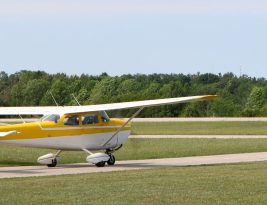What’s new in the world of aviation weather products you ask? Well, the “Experimental Graphical Forecast for Aviation” (GFA) of course! As the title suggests, this product is in experimental form at the moment, but is up and running at AviationWeather.gov. The National Weather Service and FAA are asking
…Tag: atmosphere
View All CategoriesOut here in the Pacific Northwest, there’s a saying: if you don’t like the weather, wait five minutes. Whether or not your weather changes as fast as ours does, knowing what to expect is still critical to flight safety. Radar helps us track weather nearly in real-time and make visual
…Let’s recap some of the important information we learned from Monday’s post on carburetor ice.
As air flows through a carburetor, it expands rapidly. At the same time, fuel entering the airstream is vaporized. Expansion of the air and vaporization of the fuel causes a sudden cooling of the
…Today, we’re going to look at some flight maneuvers from one of our favorite books, the Pilot’s Handbook of Aeronautical Knowledge. Critical load factors apply to all flight maneuvers except unaccelerated straight flight where a load factor of 1 G is always present. Certain maneuvers considered in this section are
…Today we’ll think about the effect of temperature on the weather. We’ve covered how solar energy from the sun drives all atmospheric and geological processes on Earth, so now we’ll address it’s role in atmospheric stability. Words and pictures in this post come from the FAA’s Pilot’s Handbook of Aeronautical
…For a thunderstorm to exist, you need two very basic elements: moisture and warm, rapidly rising air. This is why in the spring and summer months with the warmer conditions you tend to see an increase in thunderstorm activity. According to NOAA, at any given time across the world there
…[Update: In December 2022, the FAA published the Aviation Weather Handbook (FAA-H-8083-28) which replaced Aviation Weather (AC 00-6) and Aviation Weather Services (AC 00-45).]
Differences in temperature create differences in pressure. These pressure differences drives a complex system of winds in a never ending attempt to reach equilibrium. Wind also
…[Update: In December 2022, the FAA published the Aviation Weather Handbook (FAA-H-8083-28) which replaced Aviation Weather (AC 00-6) and Aviation Weather Services (AC 00-45).]
This week, we’re thinking about weather briefings. This post comes from the FAA’s Aviation Weather Services, available from ASA in print, PDF, and in a combo-pak with Aviation Weather.
Prior
…

